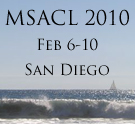| Clinical Applications of Targeted Metabolite Analysis Using Mass Spectrometry |
| Wed 2:30 PM - Track 2: Discovery Metabolomics |
Sascha Dammeier
Biocrates Life Sciences |
|
*Sascha Dammeier, *David Enot, #Matthias Keller, *Hans-Peter Deigner, *Klaus Weinberger.
*Biocrates Life Sciences AG, Innrain 66, 6020 Innsbruck, Austria
#Children's hospital, University of Essen, 45147 Essen, Germany |
|
|
Metabolites have been used in clinical diagnostics for decades. While immunoassays are not ideal for small molecules, they have become the standard in laboratory medicine to quantify metabolites for diagnostic purposes. Through the development of mass spectrometry screens in contemporary newborn screening for genetic metabolic disorders, mass spectrometry was successfully introduced into diagnostics. We have exploited the potential of targeted and multiplexed metabolite analysis by mass spectrometry for the utilization in clinical applications like disease characterization, biomarker identification, characterization of drug effects and drug off-target effects, toxicological evaluation and prognosis. Hence, it was required to systematically develop and establish validated assays for the quantification of a broad range of physiologically relevant metabolite classes. Among classical analyte sets like acylcarnitines, amino acids and sugars, the idea was also to develop esoteric assays to fully reveal the diagnostic potential of metabolite classes as oxysterols, sphingolipids, eicosanoids and others. In this presentation two examples for clinical applications of multiplexed metabolite analysis will be given. In the first study, we sought out to overcome challenges of the early diagnosis of hypoxic ischemic encephalopathy, a relevant complication in neonatology, by identifying new marker compounds. Using an animal model for hypoxic ischemia, multiparametric metabolite sets could be revealed that were able to differentially diagnose the duration of the hypoxic event as well as to characterize the harmful effect of prolonged reoxygenation therapy. In a second study, the translational aspect of metabolite markers in medicine was investigated. Therefore, the findings of a rat nephrotoxicity model that described different stages of kidney damage were aligned and interpreted against results of a human study on diabetic nephropathy containing six cohorts of diabetic and non-diabetic individuals at different stages of nephropathy. Performing a blinded and an unblinded analyses, statistical analyses revealed excellent separations between all stages of kidney disease, and novel biomarkers were identified.
|
|
|
| Email: sascha.dammeier@biocrates.com |



